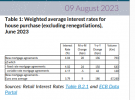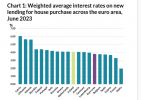Agree with
@Brendan Burgess I think there are limits to how much of a nanny state you should look for.
Brendan's proposals are about transparency & discrimination.....crossing the rubicon on pricing / bank windfall taxes etc. is a dangerous game.
The state's job is to be a referee....not a player in the market.........set transparency rules such that it allows easy comparison across institutions and remove barriers to mortgage switching. If super-normal profits emerge in the Irish mortgage market it wont be long before they are noticed and taken away via increased competition.
If you want 'lock-in' BOI & AIB's oligopoly here then just go ahead and start interfering in the pricing of product or arbitrarily taxing bank profits - not a single foreign institution would voluntarily walk into a lion's den like that & so the unintended consequence of such interference would be to reduce competition while creating a political football for future politicians to play with it.



